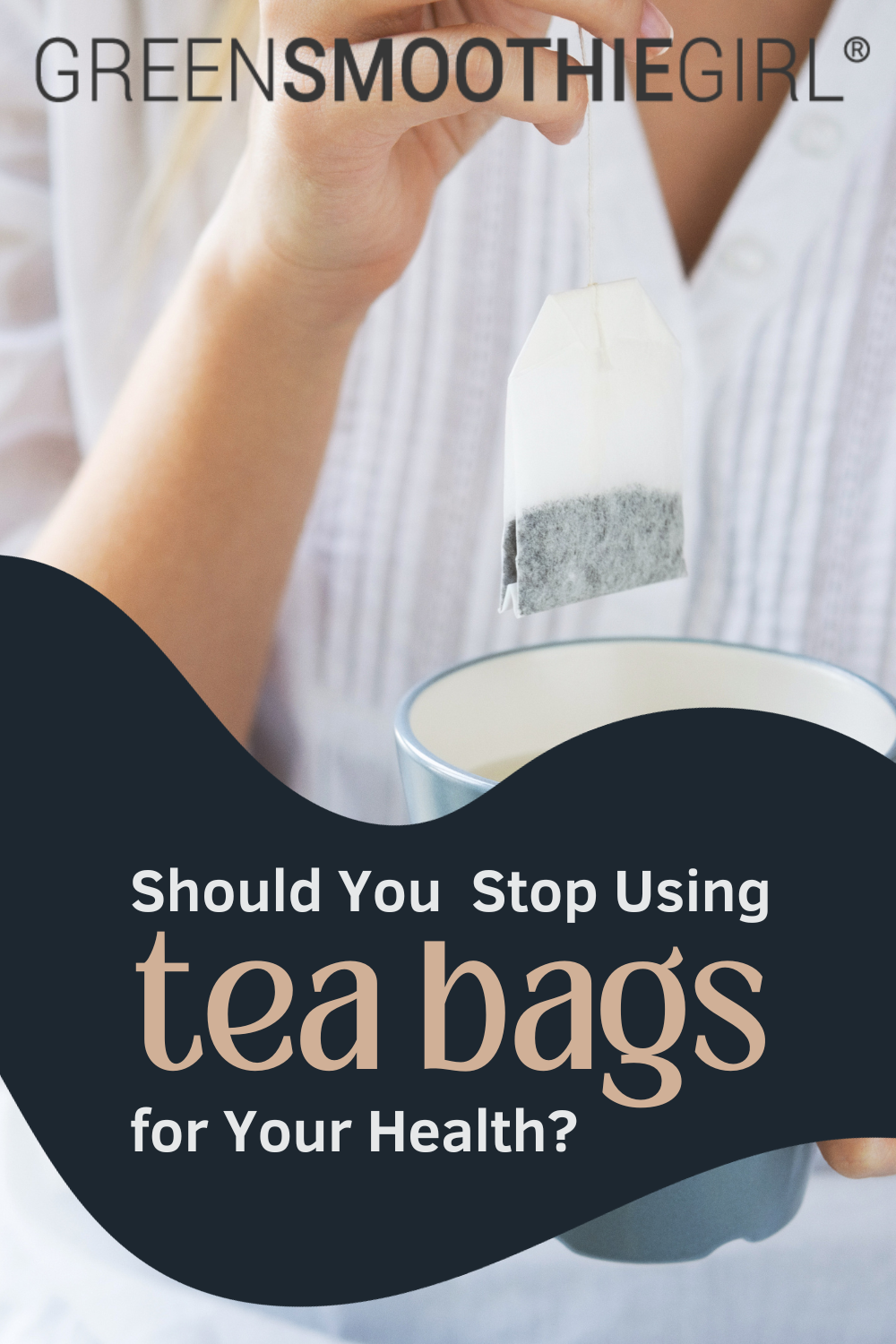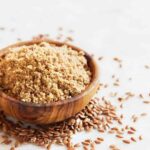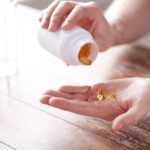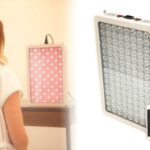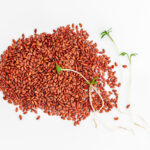Should You Stop Using Tea Bags for Your Health?
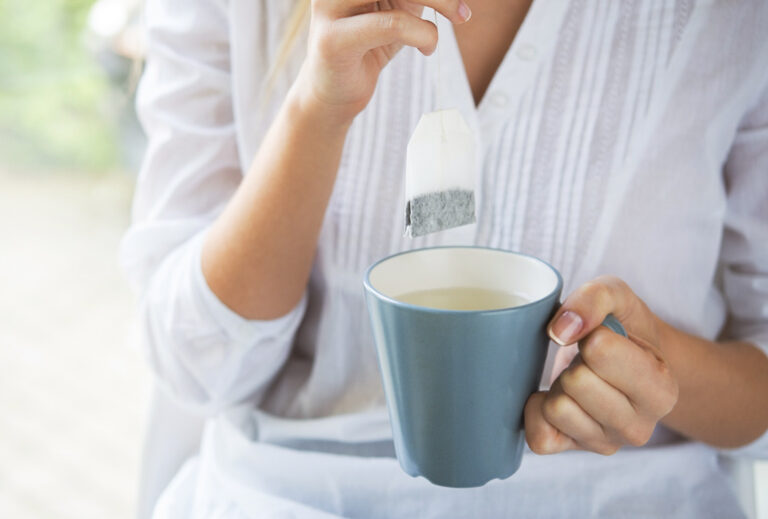
Whether you enjoy tea instead of coffee in the morning or you enjoy a warm cup in the evening, tea is the most widely consumed beverage in the world, after water.1
Drinking tea has been considered a health-promoting habit since ancient times. Modern research continues to back up these beliefs.
However, can we talk about tea bags?
Should you stop using single-use tea bags?
Here’s what you’ll find in this article:
- What is tea?
- Health benefits of tea
- Potential health concerns with tea bags
- The healthiest way to consume tea
What Is Tea
The four most common types of tea all come from the same plant, Camellia sinensis, steeping the young leaves and leaf buds in hot water.
They are:
- Black tea
- Oolong tea
- Green tea
- White tea
The difference comes from the different processing and harvesting methods.
Did you know that herbal teas are actually not “teas,” as they typically do not contain the leaves or leaf buds of tea plants?2
Herbal teas are made from tisanes, which are blends or infusions of dried flowers, fruits, spices, or herbs in water.
Some examples include:
- Ginger tea
- Chamomile tea
- Rooibos tea
- Hibiscus tea
- Peppermint tea
A Quick Overview of the Health Benefits of Tea
Green tea has been called the second-healthiest beverage in the world,3 after water, due to its high amount of nutrients and antioxidants that fight disease and help keep you well.
Green tea is also the most studied for its health benefits. In particular, green tea has been linked to low cancer and cardiovascular disease incidences.4
On PubMed, there are over 1,000 studies about the cancer-preventative ability of tea. Human studies report the benefits of tea for skin, prostate, lung, and breast cancer.
[Related: 6 Things Every Woman Should Know About Breast Cancer]
Evidence shows that black tea may have many of the same benefits.1
Tea may also have beneficial effects on diabetes. In a large study of middle-aged and older women in the Women’s Health Study, women who consumed more than or equal to four cups of tea per day had a 30% lower risk of developing type 2 diabetes than those who did not consume tea.
Overall, the polyphenols (known as strong antioxidants) and other components in tea may reduce the risk of developing many chronic diseases, such as cardiovascular disease, cancer, arthritis, and diabetes.1
Polyphenols have also been reported to have antiviral and anti-inflammatory activities, to stimulate immune function, support gut health, and assist in detoxification.4
Potential Health Concerns with Tea Bags
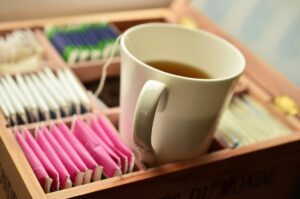
Most tea bags have some serious health concerns!
Drinking tea may sound like an excellent choice for your health, and it can be.
However, unfortunately, using tea BAGS has multiple potential concerns.
An endocrine-disrupting and cancer-causing chemical in tea bags
Many companies coat their paper tea bags with a chemical called epichlorohydrin, which is known as an endocrine-disrupting chemical5 – and is also categorized as a carcinogen.6
Epichlorohydrin is used to process tea bags to keep paper from breaking down when it gets hot and wet.
Drinking tea with hormone-disrupting chemicals is particularly concerning for those who already have hormonal issues.
[Related: 14 Common Chemicals That Affect Your Hormones]
Many tea bags are bleached with chlorine
Many companies use chlorine to bleach tea bags to make them white.
The safer method is to bleach tea bags using oxygen and hydrogen peroxide, which has no chlorine byproducts.
Plastic in tea sachets and tea bags
Tea sachets – a fancier tea bag – are made with rayon, thermoplastic, polypropylene, or polyethylene terephthalate (PET).
The plastic in these sachets can leach into the tea when it's made with boiling water.
A single plastic teabag can release 11.6 microplastics and 3.1 billion nanoplastics into your cup, according to researchers at McGill University in Montreal.7
People who drink tea frequently are continually dosing themselves with billions of plastic particles, some of which may be tiny enough to enter human cells.8
Although not a lot of research has been done about human consumption of plastics, a wide variety of health conditions have been linked to plastics in humans, such as endocrine disruption, reproductive toxicity, cancer risk, problems with metabolism, and interference with neurodevelopment.9
Most paper tea bags also use plastic-containing glues to hold them together.
Bioplastics in “natural” and organic teas
Many teas labeled “natural” and organic use plant-based PLA – a thermoplastic – made of cane sugar.
However, studies are showing that PLA may be just as problematic to humans as regular plastics.10
If You Want to Drink Tea, What’s the Healthiest Way to Do So?
- Instant teas don’t use tea bags – such as Pique Tea, which I recommend and is organic and triple-screened for toxins. The cold-brew crystallization process also preserves the health components at their maximum potential. No prep or brewing is required, making Pique Teas easy and great for taking on the go.
If You’re Looking for Loose-Leaf Tea, Here Are Some Options
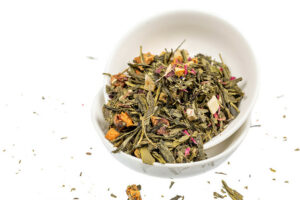
Try making loose-leaf tea in a tea strainer or pot
You may be able to find loose-leaf teas at the grocery store, or you can order them online. Here are some options, though there are many.
- Art of Tea has a wide range of organic, loose-leaf teas.
- Golden Moon Tea also makes a range of organic, loose-leaf teas.
- The Republic of Teas makes a variety of loose-leaf teas.
- Mountain Rose Herbs also has a large selection of organic, loose-leaf teas.
Some Companies Do Make Safe Tea Bags
- Gai doesn’t use plastic in its tea bags. They use chlorine-free bleached paper and cotton yarn to secure the tab. However, they only make herbal teas.
- Numi Organic Tea comes in compostable, hemp tea bags that are bleached with oxygen.
- Traditional Medicinals uses toxin-free compostable bags made from hemp. They are whitened using oxygen and peroxide and sealed with staples and cotton string.
- Earth Mama Organic teas are 100% certified organic, including their paper tea bags, which are not processed with chlorine or epichlorohydrin.
- Higher Living Teas are made from unbleached paper with organic cotton string. The bags are compostable, and the packaging boxes are recyclable.
- Pukka Herbs uses tea bags that are free from plastics and held together with organic cotton.
- Teapigs tea bags are made with cornstarch and are 100% biodegradable.
- The Republic of Tea uses tea bags made from unbleached paper, without unnecessary tags, strings, or stables.
I Love This Tea
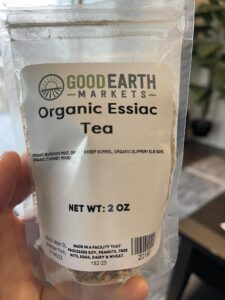
Essiac tea is great for boosting the immune system
In my 3.5 years studying alternative cancer approaches all over the world, Essiac Tea has come up over and over. So many testimonials and so much research.
Essiac tea is an herbal mixture used as a tea to strengthen the immune system, assist detoxification, and as an anti-cancer remedy.11
[Related: Open Letter to A Cancer Patient]
The name “Essiac” was created by the Canadian nurse Renée M. Caisse. According to Renée, an English miner’s wife had received the recipe for Essiac from a Native Ojibwa Indian medicine man, and had cured her breast cancer with this treatment. Renée Caisse treated cancer patients with Essiac herbal tea for 50 years.12
The four herbs used in Essiac tea are:
- Burdock root (Arctium lappa L.)
- Indian rhubarb root (Rheum officinale L.)
- Sorrel (Rumex acetosa L.)
- Slippery elm bark (Ulmus rubra/fulva Muhl.)
When I was in Utah over the holidays, I purchased several bags at the family-owned chain of health stores, The Good Earth, as gifts for several of my friends who have cancer.
This is an excellent tea for cancer, cancer prevention, and overall health. My husband has been sick, and I’m having him take it.
Where to get it?
Someone sent me this link. It’s the company Ty Bollinger stands behind for The Truth About Cancer.
Tea Can Be A Healthy Beverage, But You Need to Be Careful How You Drink It
Tea has long been consumed for its health-enhancing effects, and studies back up its benefits. However, most people drink tea from tea bags, which may have potential health concerns.
The healthiest way to consume tea is to use biodegradable, toxin-free tea bags or to choose organic, loose-leaf teas you make with stainless steel strainers or cloth tea bags.
Tea time can be a pleasant break in your day – a social thing with friends, or a time to relax if you’re alone. Will you drink more tea?
Read Next: How To Make Healthy Bubble Tea

Disclosure: This post may contain affiliate links that help support the GSG mission without costing you extra. I recommend only companies and products that I use myself.
Research
- Khan, N., & Mukhtar, H. (2013). Tea and health: studies in humans. Current pharmaceutical design, 19(34), 6141–6147. https://doi.org/10.2174/1381612811319340008
- The health benefits of 3 herbal teas. Harvard Health Publishing.
- Why is green tea the healthiest beverage in the world? PersonaLabs.
- Serafini M, Del Rio D, Yao DN, et al. Health Benefits of Tea. In: Benzie IFF, Wachtel-Galor S, editors. Herbal Medicine: Biomolecular and Clinical Aspects. 2nd edition. Boca Raton (FL): CRC Press/Taylor & Francis; 2011. Chapter 12
- The endocrine description exchange. TedX.
- Epichlorohydrin. EPA.
- Laura M. Hernandez, Elvis Genbo Xu, Hans C. E. Larsson, Rui Tahara, Vimal B. Maisuria, and Nathalie Tufenkji. Plastic Teabags Release Billions of Microparticles and Nanoparticles into Tea. Environmental Science & Technology 2019 53 (21), 12300-12310. DOI: 10.1021/acs.est.9b02540
- Ali, T., Habib, A., Muskan, F., Mumtaz, S., & Shams, R. (2023). Health risks posed by microplastics in tea bags: microplastic pollution - a truly global problem. International journal of surgery (London, England), 109(3), 515–516. https://doi.org/10.1097/JS9.0000000000000055
- Goodes, Louise M et al. A scoping review protocol on in vivo human plastic exposure and health impacts. Systematic reviews vol. 11,1 137. 5 Jul. 2022, doi:10.1186/s13643-022-02010-6
- Zimmermann, Lisa et al. Are bioplastics and plant-based materials safer than conventional plastics? In vitro toxicity and chemical composition. Environment international vol. 145 (2020): 106066. doi:10.1016/j.envint.2020.106066
- PDQ Integrative, Alternative, and Complementary Therapies Editorial Board. Essiac/Flor Essence (PDQ®): Health Professional Version. 2022 Jun 7. In: PDQ Cancer Information Summaries [Internet]. Bethesda (MD): National Cancer Institute (US); 2002-.
- Essiac. CAM Cancer.
Notes about images
- Loose leaf tea image used under a Creative Commons 2.0 license by Marco Verch
Posted in: Health Concerns, Holistic Care, Natural Remedies, Whole Food



